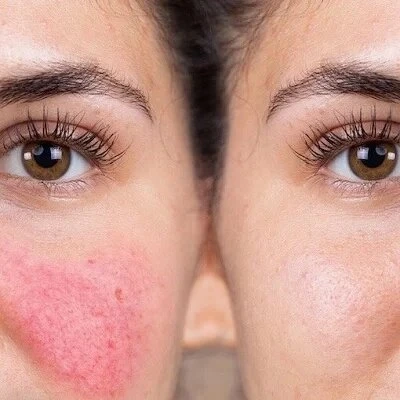How Hormones Affect Rosacea: Understanding the Connection
Rosacea, a chronic skin condition characterized by redness, flushing, and visible blood vessels, can be influenced by various factors. Among these factors, hormonal fluctuations play a significant role in the development and exacerbation of rosacea symptoms. In this comprehensive guide, we'll delve into the intricate relationship between hormones and rosacea treatment abu dhabi, shedding light on how hormonal changes can impact the skin and what you can do to manage this connection effectively.
1. Hormones and Skin: The Basics
To understand the connection between hormones and rosacea, it's essential to grasp the basics of how hormones influence skin health. Hormones are chemical messengers produced by various glands in the body, and they play a crucial role in regulating numerous bodily functions, including skin physiology. Changes in hormone levels can trigger a cascade of events that impact the skin's appearance and sensitivity.
2. Estrogen and Rosacea: A Balancing Act
Estrogen, a primary female sex hormone, has been linked to the development of rosacea symptoms. Fluctuations in estrogen levels, which commonly occur during the menstrual cycle, pregnancy, and menopause, can contribute to the dilation of blood vessels and increased skin sensitivity. For women with rosacea, understanding these hormonal shifts is crucial in managing and anticipating potential flare-ups.
3. Testosterone's Role in Rosacea
While estrogen often takes center stage, testosterone, the primary male sex hormone, also plays a role in rosacea. Higher levels of testosterone can lead to an increase in oil production, potentially contributing to the development of papules and pustules in individuals with rosacea. Understanding the interplay between estrogen and testosterone is vital for a comprehensive understanding of how hormones influence this skin condition.
4. Menopause and Rosacea Flare-ups
For many women, menopause marks a significant hormonal shift. The decline in estrogen during menopause can trigger or worsen rosacea symptoms. Hot flashes, a common menopausal symptom, can lead to increased facial flushing and redness. Managing rosacea during menopause may require a tailored skincare routine and close collaboration with a dermatologist.
5. Androgens and Rosacea in Men
In men, androgens, including testosterone, can influence the development of rosacea. Men experiencing hormonal imbalances may notice an increase in skin sensitivity and redness. Understanding the impact of androgens is crucial for effective rosacea management in men.
6. Hormonal Contraceptives and Rosacea
For individuals using hormonal contraceptives, such as birth control pills, understanding the potential impact on rosacea is essential. While some women may experience an improvement in symptoms due to more stable hormone levels, others may notice an exacerbation. It's essential to monitor skin reactions and consult with a healthcare professional to explore alternative contraceptive options if needed.
7. Pregnancy and Rosacea: Navigating Hormonal Changes
Pregnancy brings about significant hormonal changes, and for some women, this can mean a temporary exacerbation of rosacea symptoms. However, every pregnancy is unique, and some women may experience an improvement in their skin during this time. Open communication with healthcare providers is crucial to ensuring a safe and effective management plan during pregnancy.
8. Hormonal Treatments and Rosacea
Certain medical conditions may require hormonal treatments, such as hormone replacement therapy (HRT). It's important to discuss the potential impact of these treatments on rosacea with a healthcare provider. They can work with you to find a balance that addresses both your medical needs and your skin health.
9. Practical Tips for Managing Hormonal Influences on Rosacea
Now that we've explored the intricate relationship between hormones and rosacea, let's discuss practical tips for managing this connection:
a. Keep a Hormonal Diary: Maintain a diary to track hormonal fluctuations, including menstrual cycles and any hormonal treatments. This can help you anticipate potential rosacea flare-ups and tailor your skincare routine accordingly.
b. Skincare Routine Adjustments: Consider adjusting your skincare routine based on hormonal changes. During periods of increased sensitivity, opt for gentle cleansers, fragrance-free products, and moisturizers that provide hydration without causing irritation.
c. Sun Protection is Non-Negotiable: Sun exposure is a common trigger for rosacea. Regardless of hormonal influences, always prioritize sun protection. Use a broad-spectrum sunscreen with at least SPF 30, and consider wearing a wide-brimmed hat for added protection.
d. Collaborate with Healthcare Professionals: Maintain open communication with your dermatologist and healthcare provider. Discuss any hormonal treatments or changes in your health, and work together to create a comprehensive management plan that addresses both your hormonal needs and your skin health.
e. Consider Hormone-Related Triggers: Identify and manage potential hormone-related triggers, such as stress and dietary choices. Stress reduction techniques, a balanced diet, and regular exercise can contribute to overall well-being and may positively impact rosacea symptoms.
Conclusion
Understanding the intricate connection between hormones and rosacea is a crucial step in effectively managing this chronic skin condition. By staying informed about hormonal fluctuations and implementing practical tips for skincare and lifestyle adjustments, individuals with rosacea treatment abu dhabi can take proactive steps to minimize symptoms and enhance their overall skin health. Always consult with healthcare professionals for personalized advice and guidance tailored to your unique needs.


